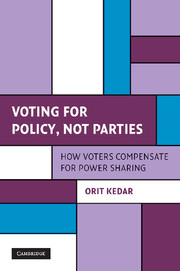Book contents
- Frontmatter
- Contents
- List of Tables and Figures
- Acknowledgments
- PART 1 VOTING FOR POLICY
- 1 Introduction: Institutional Sources of Voter Choice
- 2 A Theory of Compensatory Vote
- PART II EMPIRICAL EVIDENCE: HOW VOTERS COMPENSATE FOR DIFFUSION OF POWER
- PART III THEORETICAL IMPLICATIONS
- References
- Index
- Miscellaneous Endmatter
1 - Introduction: Institutional Sources of Voter Choice
Published online by Cambridge University Press: 19 January 2010
- Frontmatter
- Contents
- List of Tables and Figures
- Acknowledgments
- PART 1 VOTING FOR POLICY
- 1 Introduction: Institutional Sources of Voter Choice
- 2 A Theory of Compensatory Vote
- PART II EMPIRICAL EVIDENCE: HOW VOTERS COMPENSATE FOR DIFFUSION OF POWER
- PART III THEORETICAL IMPLICATIONS
- References
- Index
- Miscellaneous Endmatter
Summary
INTRODUCTION
This book is about electoral politics in democracies. It examines the way ordinary citizens make their choices at the voting booth under various, complex, political environments. At the heart of the study is an old question, fundamental to electoral politics: how do voter views translate into electoral choice? I propose a new approach with which to investigate, and a new answer to, this old question.
The main principle from which I derive insights is straightforward, and can be summarized in a few sentences. Voters are concerned with policy. In order to achieve policies most beneficial to them, they work around complicated institutional and political structures that set the rules of the game. Their calculus is more far-reaching than we might expect, and their time horizon extends beyond the night on which election results are announced, deep into subsequent post-electoral stages of policy formation. In making their choices, voters take into consideration the path parties or democratic institutions more broadly are likely to encounter the day after votes are counted, and compensate for post-electoral negotiations that will dilute their votes. Simply put, in polities and under circumstances in which policy formation is diffused among multiple players, and negotiations and compromise are likely to water down their votes, voters respond by preemptively overshooting, supporting parties that will be effective in guarding their interests under the particular institutional circumstances. Being policy minded, voters compensate for the dilution of their vote by institutional mechanisms.
- Type
- Chapter
- Information
- Voting for Policy, Not PartiesHow Voters Compensate for Power Sharing, pp. 3 - 16Publisher: Cambridge University PressPrint publication year: 2009



